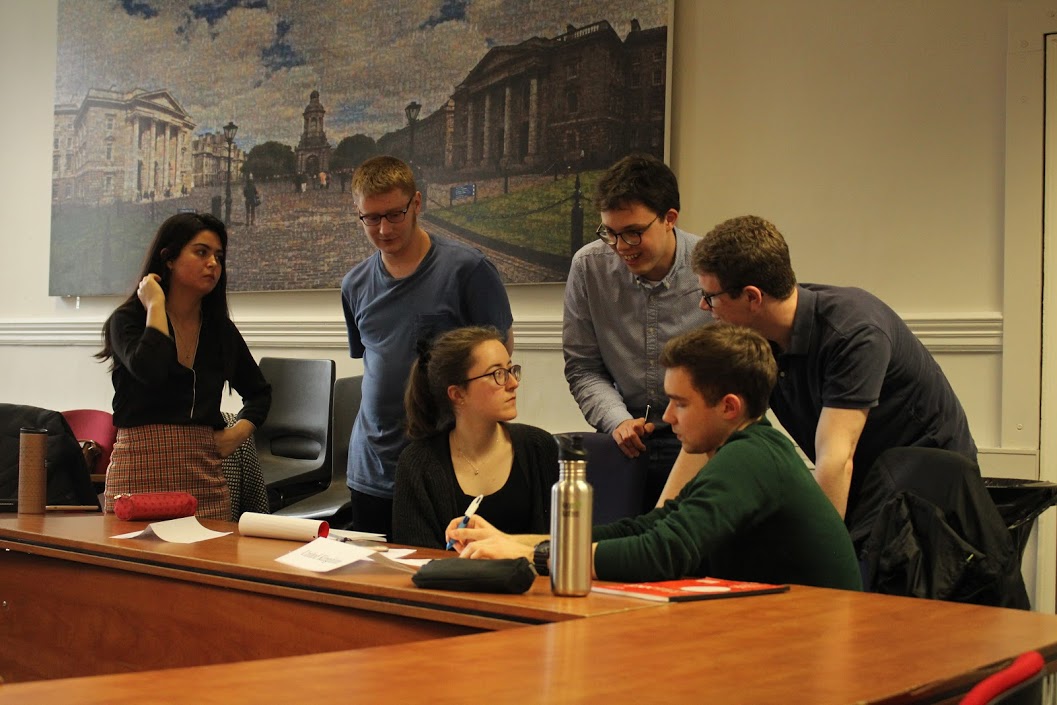On Friday, Trinity’s Society for International Affairs (SOFIA) held a model European Council debate focused on the migration crisis and the challenges it poses. The chair reminded each nation that throughout the debate they must consider the implications Brexit would have on all resolutions, Turkey’s role within the refugee crisis, which countries may or may not want refugees, and finally, which countries need more resources to support the refugees they do have.
The representative for Germany provided an opening statement, in which he argued that the EU was founded to accept people and provide them with an opportunity to access a better life and a better future. The chairs of the debate then opened the floor for state motions. Each of the six nations represented— Austria, Germany, the United Kingdom, Hungary, Greece, and France— had the opportunity to propose whatever topic they wished for council-wide discussion.
The representative for Germany proposed a discussion on the dangers of immigrants crossing oceans, potential plans for redistributing refugees throughout the entirety of the EU, and the EU’s response to foreign military interventions in conflict zones. Other motions, put forth by the representatives for Austria and the United Kingdom, included discussions of the role of Turkey in the refugee crisis, the structure of refugee camps and what their role should be in the long term, and by what means a centralized European fund for aiding refugees could function.
Throughout the debate, a number of trends emerged. State representatives were primarily concerned with the dangers of migrating through the Mediterranean, the pressure immigrants put on financially unstable countries such as Greece, the mobility immigrants have upon entering mainland Europe, the implications that will have on security, the impacts of refugee camps on quality of life and the challenges behind centralizing the aid associated with alleviating the refugee crisis. As discussions progressed, it became clear that this crisis needed more support than the European Union could provide on its own, but that no nation in the world could be forced to do anything against its will. As the representative from the United Kingdom pointed out “if there is a willingness from powerful actors to act, they will act”.
The brevity of debate, which lasted a mere hour and a half, affected the quality of the discussion. Although interesting and valid points were brought up throughout, the arguments were relatively superficial. More questions were raised than answered, and while state representatives suggested solutions, few of these solutions were expanded on.
Ultimately, the council reached a unanimous resolution to strive for long term peace in Syria and other conflict zones. This resolution could be achieved, according to the council, by encouraging the right of refugees to return to their country of origin, establishing a unified effort with the United Nations, balancing long and short term redistribution of refugees, establishing and increasing the funding for aid organizations, creating a common integration and education policy with a focus on educating refugees in History and English, and finally, working with trade unions to increase practical skills in refugee populations.
SOFIA’s first Model European Council debate highlighted the complexity of the refugee crisis, as clearly demonstrated by the lack of a substantive resolution at the end of the discussions. Despite the thought-provoking and engaging Friday afternoon debate, the model European Council, much like the rest of the international community, is still far from reaching any sort of resolution for this pervasive global crisis.






